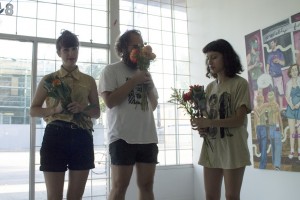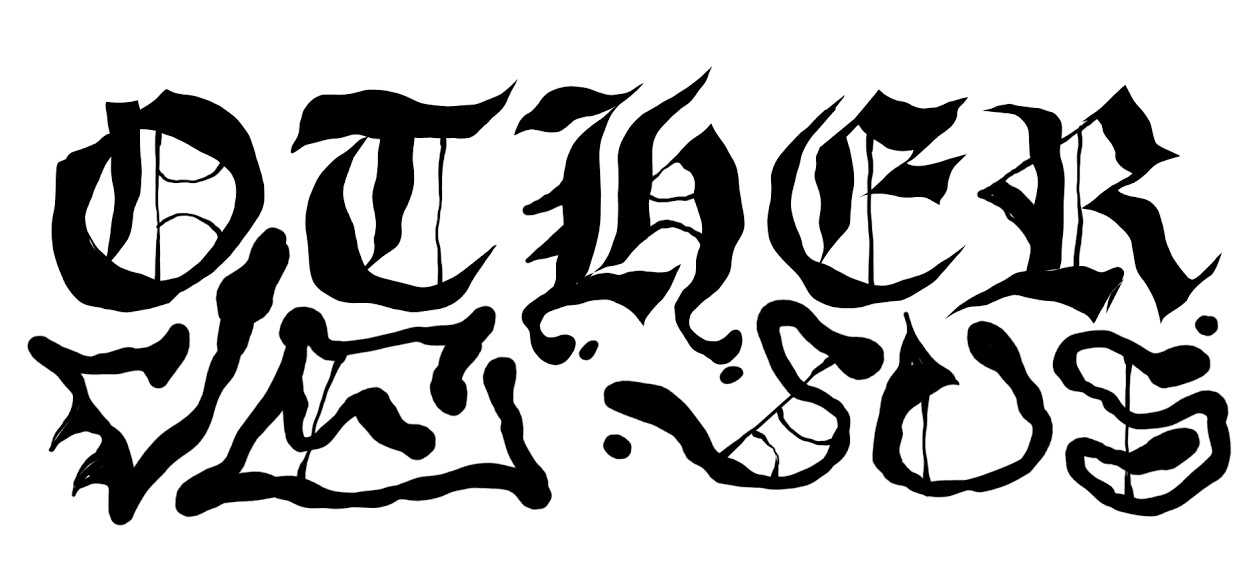For many privileged people in the city, traveling along East Hastings can be anything from eye-opening to downright disturbing. Having long been home to a diversity of Vancouver’s disenfranchised demographics, human struggle is clearly evident along the thoroughfare, while a thriving culture of art and music exists barely out of view.
To most, the marquees of the Rickshaw and the Astoria are about the only musical landmarks on the street. Though to a small, tight-knit, and ever-energetic community of artists and musicians, Hastings Street is a Mecca of creativity, strewn with warehouse-fronted venues, galleries, studios, and the like. Of these discrete and lively art spaces, the Red Gate holds a place among the most active and creative, serving as gallery, venue, studio, and rehearsal space.
And it’s at Red Gate where Discorder sits down with Other Jesus, Vancouver post-punk trio and Red Gate mainstays. Settling into the worn couches next to a stage set up for their tour-commencing concert later in the evening, Foamy Bottomeater, Tuna Turner, and Urethra Franklin — bassist, drummer, and guitarist, respectively — discuss their views on being part of that community and their career as a band, amidst a torrent of jokes.
“For me it’s just sort of natural to work in this kind of scenario and build something together in a community of like-minded people,” explains Franklin. “Often what you want to have doesn’t exist already.”
Undeniably, the band has thrived amidst the Red Gate community. Forming, rehearsing, and performing in the space, the Red Gate gives Other Jesus the freedom to creatively excel, although, as Turner says, “We don’t put any pressure on ourselves.”
For Turner, the community serves as motivation to create. “I always feel more inspired by people who are directly around me, than people that I don’t know personally. I feel like we’ve got a lot of really cool bands in Vancouver, and I feel like we feed off of each other, especially in the Red Gate.”
The community’s support has definitely given incentive for Other Jesus to evolve over the course of their still short career. Not even two years old, Other Jesus have released one record, Bachelors of Art, and are set to release their debut full-length album, Everything is Problematic, this September 19.

With a quick pace of musical output, Other Jesus believe their musical abilities are evolving just as quickly. “We definitely got better at our instruments; I think that’s the main thing,” says Bottomeater.
Having started playing their instruments with the purpose of forming Other Jesus, the band has built both the skills and the confidence to write, record, and perform a growing catalogue of loud, catchy, and often satirical post-punk songs. As Bottomeater says, “We’re just better at playing music now.” She describes how on Bachelor of Art, “We wrote the songs, and then recorded them right away,” whereas on the new record, “We wrote the songs over a longer period of time.”
When asked what’s different about their new album, Franklin explains, “The first [record] was just kind of like a foot in the door to have something because we’d never recorded an album before.” With the new record, Franklin says, “[Other Jesus] is a tighter band in general.” Turner doesn’t waste her words in stating that Everything is Problematic is “completely professional… to summarize, this new album is just better music.”
Though Other Jesus lacks neither the confidence nor the work ethic to succeed, they insist on their band’s dependence on Vancouver punk band Lié for their success. “If you play Lié’s album backwards, it’s our album forwards,” claims Bottomeater jokingly. “There’s a loophole with the copyright law.”
This playful banter isn’t exclusive to their group dynamic. Everything is Problematic continues to engage in the same tongue-in-cheek take on artistic and musical pretentiousness that their first record addressed. However, Everything is Problematic pokes fun at more than just art-gallery snobbery, as the band takes greater aim at radical leftist politics, particularly in their album title.
“The album name actually comes from an article written by a McGill student,” says Bottomeater. “It was just talking about how we all operate in a small segment of society… and the politics of that society [make] everything problematic.”
The work she refers to is Aurora Dagny’s 2014 article “Everything is Problematic” from the McGill Daily, which addresses the dangers of getting caught up in the group mentality of anti-oppressive politics. While the article touches upon markedly engaging and controversial views on social justice and the culture that surrounds it, Other Jesus are quick to employ these concepts jokingly.
Additionally, there is a literal element to their album title. “It’s how the songs ended up on the album,” explains Bottomeater. To clarify Turner points out, “There’s a fuck up in each one of them. Everything is problematic.”
With self-depreciation and self-respect running equally strong amongst themselves, Other Jesus are clearly at home and comfortable with what they’ve become over the few short years they’ve been playing together.



